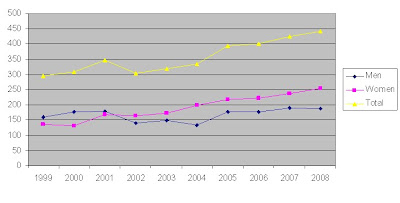“It’s a nice country to be gay meaning that we actually have the possibility of people of the same sex having a matrimonial contract between them. I have a student that is a lesbian and it's no big deal,” he said. “You are not aloud to discriminate in public from a social perspective. You will always have people everywhere who will disapprove of certain type but I should say that the community in Denmark is quite liberal.”
Liberal enough to satisfy the homosexual community? Not entirely. While Denmark takes pride in initiating this spread and therefore may appear as a gay haven, most homosexuals agree there is more work to be done. “I am convinced that few Danish homosexuals are completely satisfied with status quo,” Helweg said. “But it is also a fact that many of us dissatisfied homosexuals disagree on the strategies on how to do the job that still lies ahead.”
The homosexual community is divided between celebrating its progress and fighting against the standardization of values based on heterosexual norms. There is a fear that the homosexual subculture will be lost. “It is a fight fought in the shadows of normality and conformity and not for variety and open-mindedness towards different values and different ways of living,” Helweg added.
While extending rights to same-sex couples may not entirely satisfy the homosexual community, most Danish citizens agree that same-sex marriage and homosexuality are accepted because that is how the Danish are raised.
“We are known to be tolerant and accept most people the way they want to be. People here find pride in not being judgmental,” said Julian Plucnar Jacobsen, a Danish citizen from Solroed Strand. “Out of say 12 political parties, 2 or 3 would be against it but the majority of people would be for it. It is an on going process, but they are respected. They would rarely get comments in public and if you saw a couple kissing you wouldn’t say anything.”
Many other countries are following Denmark’s lead. Norway took similar action in 1993, followed by Sweden in 1995 and Iceland in 1996. Other nations expanded the rights of same-sex partners by granting certain statuses that avoided the term “marriage” by substituting terms such as civil unions or civil partnerships. The first country to legalize same-sex marriage was the Netherlands followed by Belgium in 2003, Spain and Canada in 2005, South Africa in 2006, and Norway just two years later.
In the U.S., the majority of states have Defense of Marriage Acts serving to ban same sex marriage by defining marriage as a union between man and woman. Across the country, activists are working to fight state bans with the argument that such bans violate equal-protection guarantees in state constitutions. In November 2003, Massachusetts Supreme Judicial ruled barring same-sex couples from marriage unconstitutional.The Court stated, "Segregating same-sex unions from opposite-sex unions cannot possibly be held rationally to advance or preserve the governmental aim of encouraging stable adult relationships for the good of the individual and of the community, especially its children."
Under this decision, the state of Massachusetts began issuing marriage licenses to same sex couples in May 2004. Now, Massachusetts, Connecticut, Iowa, Vermont and New Hampshireissue marriage licenses to same-sex couples. Rhode Island and New York recognize same-sex marriages from other states, and New Jersey allows civil unions. However, gays and lesbians do not receive nearly the same amount of respect as those in Denmark.
“We need to deal with the reality of peoples lives, not how we want it to look,” says Director of the LGBT Center at Ohio University Mickey Hart. “It has really gone state to state. Even states that have benefits like California have now changed. It’s back and forth. This is a federal constitutional fight because we don’t have the time, energy, effort or money to go state by state. If we would have done state by state for civil rights we would still be working.”
While the people of Denmark think of themselves as the “most tolerant and most democratic,” Hart says the United States is not as willing to accept the rights of the LGBT community.
“I think we tend to be very bias and judgmental,” he said. “We tend to go through this process of denying people rights then looking back and asking how is that allowed to happen? Who were those people and what were they thinking? Well, we are those people.”
Rasmussen says it starts with the way gays and lesbians are covered in the media. For example, in the United States if a gay or lesbian politician was running for office that would be at the forefront of political debate. In Denmark, however, a personal decision such as a person’s sexuality is just that that.
“There was once a rumor about the last prime minister that she was bi-sexual, but it is not an issue and it never went to the newspapers because that is not what the Danish newspaper or people would do,” Rasmussen stated. “That is something the English papers will focus on but here that kind of information is not important to the political decision making process in general.”





No comments:
Post a Comment